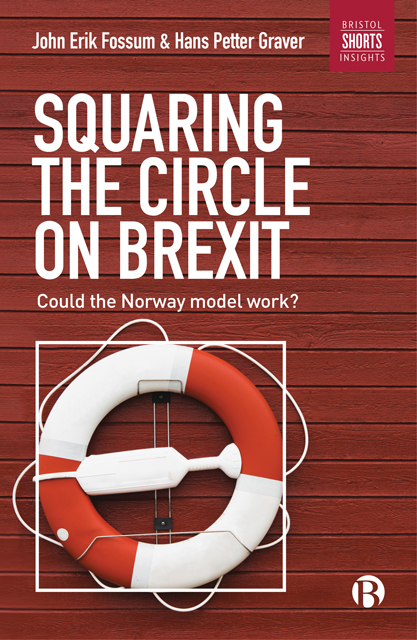Book contents
- Frontmatter
- Contents
- Foreword
- Preface and acknowledgements
- List of abbreviations
- Introduction
- 1 What does Britain want from Brexit?
- 2 Forms of affiliation with non-members
- 3 What is the Norway model?
- 4 The challenge of sovereignty
- 5 What can Britain learn from Norway’s experience?
- 6 Would Britain be an ‘elephant in the boat’?
- Conclusion
- Notes
- References
- Appendix
- Index
5 - What can Britain learn from Norway’s experience?
Published online by Cambridge University Press: 21 April 2023
- Frontmatter
- Contents
- Foreword
- Preface and acknowledgements
- List of abbreviations
- Introduction
- 1 What does Britain want from Brexit?
- 2 Forms of affiliation with non-members
- 3 What is the Norway model?
- 4 The challenge of sovereignty
- 5 What can Britain learn from Norway’s experience?
- 6 Would Britain be an ‘elephant in the boat’?
- Conclusion
- Notes
- References
- Appendix
- Index
Summary
Brexit is about dealing with the trilemma of state sovereign control, democratic self-government and market access. The different circumstances surrounding Norway and the UK will not simply revolve around differences in bargaining strength, but rather in terms of the relationship between the pressures for continued market access, the contingent and complex process of bargaining, and the legal and normative principles and values involved, including political grandstanding/symbolic politics by all kinds of actors. The EFTA countries have ensured market access but at the expense of state sovereign control and democratic self-governing, not formally speaking, but in actual practice. In addition, these countries, as the Norway example testifies, have not confined the effects to market-related issues. Affiliation to the EU is therefore not simply a matter of market access but of incorporation in the broader legal and socioeconomic order that the EU has been constructing over time. The distinctive feature for the closely affiliated non-members is that the type of affiliation that they have chosen is akin to voluntary hegemonic submission (Eriksen and Fossum, 2015). The EU is not set up to be a hegemon but some of its relations to (non-)members are hegemonic in practice if not in their intents, because of the consistently articulated need to retain the integrity of the EU legal system, the acquis, when dealing with the association of non-members. In this, the political institutions of the EU are bound by the legal rationality of the CJEU. This has clearly and consistently been spelled out by the court since its Opinion 1/91 on the EEA Agreement. This will restrict also the type of association that the UK can obtain with the EU.
Squaring the circle for the UK
As we have seen in Chapter Four, the main challenge with regard to market access is sustaining equal rules and conditions over time, given the dynamic nature of the EU. The Norway model is dynamic so as to minimise the problems of market access. There is also the matter of compliance, which is closely monitored. There has been considerable expansion into related flanking areas, such as environmental and social affairs. In addition, the dynamic nature of Norway’s association with the EU makes it difficult for Norway to prevent areas that have been explicitly excluded from the agreements being subsequently pulled into the EU’s orbit.
- Type
- Chapter
- Information
- Squaring the Circle on BrexitCould the Norway Model Work?, pp. 87 - 108Publisher: Bristol University PressPrint publication year: 2018



